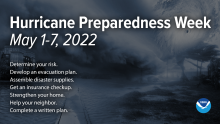ST. CROIX, U.S. Virgin Islands –- Today is an excellent day to begin preparing yourself and your family for the upcoming Atlantic storm season. During National Hurricane Preparedness Week, assess your personal risk, practice your family's emergency communications plan, begin replenishing your emergency kit, and examine your insurance plans.
The hurricane season runs from June 1 to November 30, but do not wait until shop shelves run out of supplies, food, and water, lines form at gas stations, and ATMs run out of cash when a storm forms in the Atlantic to update your emergency plans.
The time to prepare is now under blue skies.
FEMA and its partners in the U.S. Virgin Islands are set to test their capabilities to respond to storms and will conduct a series of response exercises this spring and through the summer. “We focus year-round on preparing for storms and are ready for the upcoming Atlantic hurricane season. The territory will have FEMA’s support if it requests federal resources for preparedness and response,” said Virgin Islands Caribbean Area Office Coordinator Mark A. Walters. “We are asking Virgin Islanders to take a vigilant stance to prepare their families, communities and businesses for hurricane season. It takes only one storm to cause a disaster,” said Walters.
"By building and sustaining effective partnerships with federal, state, and local government agencies, and with the private sector, VITEMA ensures the territory’s ability to rapidly recover from large and small disasters by assessing and mitigating hazards, enhancing preparedness, ensuring effective response, and building the capacity to recover,” said Daryl Jaschen, Director of the Virgin Islands Territorial Emergency Management Agency.
“Emergency management is a shared responsibility: government cannot effectively build resilience to disasters by itself. Individuals, families, and communities must work to mitigate risks, prepare themselves and their communities for disasters, build local partnerships that will help government agencies respond to, and care for those impacted by disasters," said Jaschen.
There are steps you can take right now to ensure you and your family are better prepared in the event of an emergencies.
- Make sure everyone in your household knows and understands your hurricane plan. Discuss the Virgin Islands Department of Health's recent COVID-19 recommendations and how it may affect your hurricane preparations. Remember to bring a plan to the office, the kids' day care, and everywhere else you go.
- Identify any additional help needed in an emergency if you or anybody in your home is senior or has a disability, access, or functional requirement. The V.I. Department of Human Services’ Elder, Dependent Adult, and Disabled Persons Disaster Registry is open to Virgin Islanders aged 60 and over, as well as those with disabilities.
- To register, call 340-774-0930 ext. 4018 on St. Thomas, 340-776-6334 on St. John and 340-773-6630 on St. Croix. You can download and fill out a registry form at www.dhs.gov.vi .
- Have several ways to receive alerts. Sign up for Alert VI to receive emergency notifications in the U.S. Virgin Islands. Download the FEMA app on your smartphone and receive real-time alerts from the National Weather Service for up to five locations nationwide. Check the settings on your mobile phones to make sure you can receive Wireless Emergency Alerts, which require no sign-up.
- Have an emergency charging option for your phone and other devices.
- Protect your home against storms. Declutter drains and gutters, consider hurricane shutters and leave room in your home to bring in outside furniture during a storm.
- Learn your evacuation routes, practice with household, pets, and identify where you will stay during a hurricane. Follow the instructions from territorial agencies who will provide the latest recommendations based on the threat to your community and appropriate safety measures.
- Make sure your insurance policies and personal documents like ID are up to date. Make copies and keep them in a secure password protected digital space. You may need your documents to apply for and receive assistance after a disaster.
- Have enough supplies for your household, include medication, disinfectant supplies, masks, pet supplies in your go bag or car trunk. After a hurricane, you may not have access to these supplies for days or even weeks.
- Replenish supplies in your emergency kit and replace expired items as needed.
Visit www.ready.gov/hurricanes or www.ready.gov/es/huracanes for more information on how to prepare for hurricanes, stay safe during a hurricane and returning home after a hurricane. Review Hurricane Preparedness Week’s themes, such as how to get an insurance checkup and how to strengthen your home, at www.weather.gov/wrn/hurricane-preparedness , and follow www.vitema.vi.gov for information on local events and community readiness.


